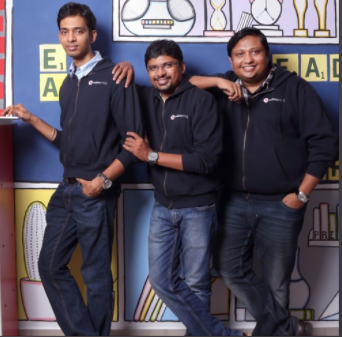Schoolmates turned Co-founders of India’s Largest Publishing Platform share their Success Formulas
Here’s the Transcript:
[Music]
Kiruba: Hello and welcome to the Movers and Shakers podcast, where we speak with passionate achievers in business and in life. This is where we ask the right questions to dissect the DNA of their success. The whole idea is how we can become better by learning form others. In this episode, we speak to not just one but three people. The three of them are co-founders at Notion Press. Notion Press has grown to be one of India’s largest publishing platforms. They help authors with book production, publishing, printing, and distribution services. It’s very interesting how I got to meet them. A few months ago, I finished my manuscript for a book titled First Book, you know, this is a book where I compile best practices and advises from bestselling authors, meant for people who are writing their first book. And it was just at that time that a mutual friend of ours introduced me to the three co-founders and we met for dinner and we instantly hit off. The reason why we hit off was because Notion Press is exactly doing what I am doing as well, which is, they are making life very easy for first-time authors. Ask anyone who has authored a book and trust me when I say this, I’ve done five and it’s very, very difficult to pass through the gates of a traditional publishing house and to have them publish your book. So, they make it very easy for first-time authors, and they’ve grown phenomenally well as well. They started their business on January 1, 2012, and in a little over four and a half years, they’ve grown to over 50,000 members, their publishing reaches over a hundred countries and last month, they closed a million dollars in funding. For me, the real motivation to go speak to them, is not so much in their growth story. For me, it was about how three schoolmates got together and worked seamlessly together to build this company and, you know, I was very fascinated by the chemistry between the three of them. So, I decided that I should go meet them up and really find out what is the secret sauce that really bounced in together. I was very fascinated how they handle disagreements, how did they handle when they don’t agree on certain things, how did they handle the pressures of scale and growing globally. So, I’ve asked a lot of very fascinating questions; I’ve received very fascinating answers as well. This is an interview I thoroughly enjoyed and I’m sure you’ll love listening to them as well. So, with that, let’s just jump right into the podcast.
Kiruba: Over 55,000 community members, over 2,000 first-time authors, books distributed in over a hundred countries and they just closed a million dollars in funding. So, Bhargav, Jana, and Naveen, congratulations on the way how you have grown Notion Press to this level. But first, how did Notion Press begin?
Naveen: Thank you, Kiruba. We started Notion Press in January 2012. We wanted to publish a book, Bhargav and I, and we approached Jana, who was already a publisher. His response was kind of shocking to us; he said, “No, he cannot publish this book.” We were like, “Dude, you’re our friend. You’re supposed to publish our book.” So, that’s when he introduced us to reality and told us that that was not how publishers think. So, looking at other alternate options, we found self-publishing and we found that there were not many credible self-publishing companies in India at that time and you know how it works – you have a problem, you try to solve it yourself and you end up starting a company. So, that’s how we started Notion Press also.
Kiruba: To set the context right, all three of you are actually schoolmates. Is that right, Jana?
Jana: Yes. Naveen and I are classmates and Bhargav is my junior.
Kiruba: Got it. So, Bhargav, after school, each one of you went to three different colleges. In fact, geographically, from three different directions in the outskirts of Chennai. What is that made you guys stick together?
Bhargav: Naveen and me have been working together even after school. So, we used to run blogs together and we used to design multiple applications in our computer classes. So, we just stayed in touch and when this need arose, where we wanted to build a publishing platform for India, that’s when we came together with Jana.
Kiruba: A lot of people think that the success of co-founders results because the chemistry is very nice between them. But the actual truth is that there is a strong base that gets built. In your case, it was school friendship that you continued to keep that friendship alive even during the college days. And then you joined together, right? That’s very important to have that chemistry. Right, Naveen?
Naveen: Correct! In fact, more than that, what we did was we established some ground rules. We realised that as more success comes or failure comes, there could be a lot of conflict situations that we had to handle. So, somewhere around December 25th, just before starting the company, we sat down in Bhargav’s house and wrote the rules of what we mean to each other and what we mean to the company. That’s the benchmark we go to even today when we have any conflict.
Kiruba: You guys are young, right? In 2012, you were even younger. I would imagine sitting down and writing ground rules, you know, coming from a 40-year-old after having 15 years of work experience. So, how did that come about? The maturity to ensure that each one of you will take individual task; you won’t step on each other’s toes. Where did that come from?
Naveen: So, Kiruba, Naveen here. For this, Bhargav’s father has been a mentor since we started. He used to head a division for HCL; so, he is the one who came up with the idea and said, “You guys are starting out. You’re going to see a lot of things in the future. So, why don’t you guys sit down and put down your thoughts about what you want for each other and what you want collectively so that tomorrow there’s no confusion about it. So, that’s when we sat and wrote these ground rules.
Kiruba: Okay, and you started the company on January 1, 2012. What were the ground rules that you guys set? What were the responsibilities you guys took on for each other? Jana, you wanna…?
Jana: Each one had each capabilities. Bhargav is into tech, Naveen is into sales and marketing, and I’m into publishing and distribution. Each person will have veto in their domain. So, if something comes up in publishing, it’s my decision. If something is regarding tech, it’s Bhargav’s decision. So, this is how we manage the thing.
Kiruba: And, Jana, it was easy for you because your dad ran a publishing/printing business, is that right?
Jana: No, publishing and distribution business.
Kiruba: So, it was there in your blood and did your dad help you out in all this because it’s a very related business.
Jana: Yeah, we used to get a lot of advises on publishing and production part from him. I had a lot of advises from my dad and I also got a lot of connects from my dad in publishing.
Kiruba: So, that’s also the danger right, Bhargav? Because when you have people advising you, who are in the traditional forms of business, it is very easy to just latch on to a traditional ways of working. But you guys broke the mould. You have put, you know, online as your main area of focus. So, where did that thought process come from?
Bhargav: You see, it’s always a good thing to have a mentor in the publishing industry. But the thing is that only one person knows publishing and the other two were mostly into tech. So, when we started out, we didn’t look at the traditional route. We thought how do you make a platform and how do you make it accessible for first-time authors to get their product out there. So, that’s where our entire focus was and that kind of helped us to; sometimes, Jana would ground us back to reality saying something was not possible in publishing and sometimes we challenge him saying that we have to do this otherwise we can’t scale the market or we can’t achieve something that’s…we can’t be the same other publishing company. You need to do something different. So, that’s how we brainstormed together.
Kiruba: I’m sure there are multiple occasions when you guys were at loggerheads, right? Even though each one of you have a veto in your own area, but there are situations where you don’t agree with others’ decision and sparks fly. How do you handle that? How do you ensure that disagreements with certain ones actually does not affect the relationship?
Naveen: So, a large part of that has been, I mean, we’ve been helped by having disagreements even before this – before starting Notion Press, right! So, having been friends for 15 years, we’ve only had disagreements over everything. Which cricketer you support, which movie you watched! Then you start building healthy appreciation for each other. But when it comes to money and business and things that are little more important, what we did was we created, in fact, even today, we foster a system where it’s okay to be challenged as long as you can explain. So, even when we work on a plan today, we have somebody come in. Even if he is a junior employee, who has just joined in, we allow him to challenge our thought process and that fosters a culture of being able to question this status quo. So, that mentality is what I think helps us even in this conflict situations.
Kiruba: So, Bhargav, I’ve seen multiple cases in startups where people actually, you know, venture capitalists, actually advice not to work with family or friends. When you are especially seeking because you don’t want to mix friendship and money. But you guys are complete outliers. You’ve made friendship really work for you. But what would be your advice if you were to advise other startup folks wanting to find co-founders? What would be your advice?
Bhargav: I think you can go with friends because they probably understand you better. You can find an equal co-founder also with a technical expertise but sometimes, you need friends to bounce off your ideas also. So, it might be better if you guys are friends and if you’ve known each other for a long time.
Kiruba: In this case, you’ve got lucky because the three of you had hugely complementary skills. But if a guy, let’s say, has a very good idea but has zero technical knowledge, or a technology guy with an awesome idea but wants somebody with a strong business backing; what would be your advice? Where do you think they can go ahead and find founders?
Naveen: I think the best place to start would be within your own circles. Like Bhargav said, while working, it’s okay; you can have people with complementary skills and all that but when you startup, your life is beyond your work, sometimes. There are conflicts issues that you need to handle personally. There would be people who come out and ask, “Why are you doing this? You had a well paying job. Why are you coming and doing this?” So, you need a support system and I think the best place to search is within your circle of people that you know. And if you don’t find anybody, I think the world has become a much open place for you to go out to different startup communities and startup events to pitch your idea and find your founder. But I strongly believe that if you have the same moral values as another person, you would be able to make that connection no matter what.
Kiruba: Jana, what are some of the advantages you find in working as co-founders? For example, I am a solo guy; I am the boss and the one who takes the decisions. But in your case, three of you work so well with each other. What are the advantages you find in having partners?
Jana: We can handle pressure, allocate work, divide the work among ourself and work better and also we can complement each other better.
Kiruba: Got it. Bhargav, what advantages have you found?
Bhargav: Well, I would say that I am more of a techie and I have no knowledge about how to do business or marketing or I had no core industry knowledge about publishing. So, when we three got together, it was a complete eye-opener to learn about the kind of marketing you can do and what you actually need to do for printing, what kind of paper should be used, and more.
Naveen: So, I’ve always found that more often and not for me, having co-founders, the best part is that you get to have a lot of fun. If you are alone, you’re absolutely scared and you are running all the time. So, here, even when there is a huge situation or pressure that’s happening, these guys will definitely find a way to make a joke out of it. So, that’s a very important thing. And then you go back and say, “Okay, macha, what else do we do?” You have a group of people to whom you can say that and that peace of mind is what keeps us alive, running this.
Kiruba: I think I agree because they say it’s lonely at the top. And when you have friends at the top, it’s even more fun for you to work. Another important thing in scaling up business; how big is Notion Press is in terms of number of people?
Naveen: We have about 120 people at the moment.
Kiruba: They say that the success of a good company that scales up is also to build your second rung of leadership. How did you guys hire the people and more importantly, what are you doing to retain them?
Naveen: How we hired people, the second rung is exactly the way we got together. We found people who were excited from within our circles. Some of them were working in very large companies like Oracle and they decided to join us because they were as passionate about what we did and they saw growth. We believe in not just having passion, but they need to have their life goals aligned to ours. Otherwise, what happens is, after a while, it dies down and you will find yourself thinking if you made the right decision. So, when we hire somebody, we talk to them very personal about what their life goals are and see whether our growth aligns with what they have in mind. If it aligns, then we decide to work with them. So, far we’ve got about 4 to 5 people in leadership and it has worked out phenomenally for us.
Kiruba: Bhargav, you head technology and I like the kind of innovations that you have bought in to the website, which is like it’s immediately scalable right from go; anybody anywhere in the world can come and take your services. What are some of the unique innovations that you’ve done?
Bhargav: What we have done is, in India, the problem in India is you never know how many books you sell because there is an annual royalty model and annual sales report model. So, the first thing when we came out with Notion Press was that we needed to make sure that people knew how much they are selling. We started giving them live sales report. So, whenever an order comes in and the book is sold, the author immediately knows how much he or she is going to make in that order. We pay it 30 days. If your book is sold today, in the next 30 days, you are going to get your money. We also started building tools for promotions. So, we understand that, for authors, a book might be highly priced sometimes. But you need to give those special coupon codes you like, your first circle, your second circle or to corporate and stuff like that. We allow authors to start setting up their own coupons to set up their own promotions from within Notion Press itself and it appears on Flipkart, Amazon, and all the other stores. Those are the kind of things we keep working on and start building more tools for launching tools. We’ve built tools for launching books, sort of like viral campaigns to launch your book. We start building on these quirky ideas to do good marketing for books.
Kiruba: The term Authorpreneur is a very interesting one. I like how Notion Press sees every book as a startup and every author as a CEO and I completely agree with that because having authored books, I’ve seen the kind of impact the books have had in my own business and building my personality. So, explain Authorpreneur and how did you come up with that concept?
Naveen: A couple of years ago we were sitting and thinking; we saw that a lot of our books peaked and suddenly the sail started slowing after a certain point. Once we noticed this point, we were wondering what’s happening with that. We found that authors kind of lost interest in promoting their books or something that was happening. That’s when, we thought, maybe we need to do something for the community and we need to help these authors. So, I was talking to one of these…I usually use these focus groups as set of authors that we are very close with to talk to them to find out what’s going and I was talking to one of the authors, who said, “Dude, the reason why I am successful is because I don’t like an author but like an entrepreneur.” His book sells consistently even today. That’s when it struck that it’s not something different from what we do here; we’ve been treating authors all along as they are writers, they are creative people and all that. I think if that changes, this whole thing about an author only being a creator and not willing to do anything else; if that culture changes, we will have more successful writers. Now you look at it, all your commercially successful writers like Chetan or Amish, they are all excellent entrepreneurs. They would be able to head any business and run it because there is that discipline and logic that is associated with what they are doing. So, that’s why we wanted to foster that culture and to be able to do that, we coined this term Authorpreneur and we wanted to promote that.
Kiruba: Got it. Jana, you head publishing and distribution, right? It’s amazing that now it has reached a hundred countries, which means that anybody from any of these hundred countries can potentially buy and you will ensure that the book reaches them and that’s phenomenal. How did you make this happen?
Jana: We have tied up with a lot of printers locally in those countries, strategically located countries. Whenever an order comes from the ecommerce stores, the books get printed locally and shipped to their country, directly to the customers.
Kiruba: And this is very helpful right? And this is the beauty of print-on-demand. If somebody from Macedonia buys a book, that particular book gets printed out there and gets distributed as against printing it here in Chennai and then couriering it to Macedonia. Correct?
Jana: Why did you go for venture capital funding? What was the need for you to raise money.
Naveen: After a point, we realised that the business had a huge abilities to scale. So, as like the entrepreneur Steve Jobs said, “You can only connect the dots looking backward.” Now, when we look at it, we are kicking ourselves thinking why weren’t we faster! When we started, we didn’t know that the market was this big. So, at one point, you realise that it keeps growing and that’s when you decide, hey, if you play it right, now that you’re at the top of the game, if you play it right, you could be a global player. So, we’ve always wanted Notion Press to be a global brand in publishing because you compare what we offer with anybody across the world, we stand out as being one of the best. We built that for Indian audience. So, we want to take it to other countries also and we realised that to be able to go to other countries quickly and not do the same mistakes we did in the past four years, we needed to raise funds.
Kiruba: And what specific steps are you taking to take Notion Press global?
Bhargav: First, we start focusing on which country has a good, let’s say, readership and literacy rate. So, we start thinking about if we want to enter, is there a regional language in the country. If there’s a country, are books being published in the regional language? Are people in that country actually reading books? Is that a pass-time or if it’s a tourist country, people don’t read a lot of books in those specific places. If it’s more of a developing economy, where technology and innovations are nurtured, there’s better literacy rate. We start focusing on which countries and where people like to read and where people want to get published can go on to share their ideas. So, we start focusing down on those countries and are planning to enter those markets.
Kiruba: Got it. Is it secret about the next set of countries you want to expand? Or, is it okay for you to answer this?
Naveen: Yeah, yeah! We are expanding next month so I don’t think anybody will be able to expand much earlier. We are planning to enter Sri Lanka, Singapore, and South Africa, primarily because of the factors that he said. Our market research shows us that these countries have a good literacy rate, a very vibrant author-reading community, good e-commerce and these are things that are required for any writing community to thrive. So, once we find that these are available, the approach we take in these countries might be different and what we did in India. It could be ebooks, it could print books, or it could be a combination of both. But our learning will come from each of this market.
Kiruba: There’s this perception that self-publishing is equal to vanity publishing and there’s this perception that when your books get published by publishers of repute, then your book is better. So, how do you handle this stigma?
Naveen: We felt this stigma in 2012. By 2014, we don’t feel this stigma a lot today primarily because of the success stories that we’ve been able to build, one thing. Second thing is when was the last innovation made in publishing? It’s probably a 1000-year-old industry. The way we look at it – the difference between self-publishing and vanity publishing – a lot of people have a misconception around it. Taking a professional’s help to produce a book is not vanity. The reason why you publish your book, if it’s to just do things that don’t make ROI sense, that’s vanity. If you have a huge launch, where you invite your friends and family and it doesn’t any ROI value, that’s vanity. If you look at the catalogues of our services, we stay clear of anything that says vanity. But at the end of the day, just like any other platform, it’s for the user to use us the way they feel like. So, we enable them to publish books. Why they publish books, the reason would define whether it’s self or vanity publishing.
Kiruba: Got it. I can tell you from my own experience that I don’t think that I have had any big advantage having my first two books done by a traditional publisher. So, you would typically go to a publisher because they will carry the chunk of the load and I really didn’t see much value and for the kind of royalty that I was getting, it just didn’t make sense. Which is why I think there’s going to be a tectonic shift in the entire publishing industry. Let me ask you this questions – where do you see traditional publishing or publishing as an industry going ten years from now.
Naveen: I’ll answer that Kiruba. Naveen here. I think it’ll get a lot more data driven because a lot of publishers, I’m very sad to say this, but a lot of publishers who are not data-driven will not be able to sustain themselves.
Kiruba: Explain data-driven.
Naveen: As more and more books are selling on Amazon, even the decision from what other kind of books we are going to publish from a traditional publisher’s point of view, will come from the data analytics that the market throws. You have your Neilson reports, you have your Amazon data; if you’re able to pull all of that data and then find out the gaps, if you’re able to identify this is the potential market we are not addressing, or no book is addressing, that’s where you have your best-seller. That’s one thing. Second thing is, when I say data, it’s on the people’s side. So, what are people reading? The kind of analytics that have never been built in India. You must have heard of new apps like Jaggernaut that are coming up. I’m sure that soon they’ll be able to provide amazing insights into what people are clicking, what people are reading. This is the new direction for content itself. Third thing is, there’ll be more models coming in that traditional book-selling. This whole idea of creating a book into a paperback or a hardcover or an ebook and selling them is definitely going to be disruptive. We are thinking more like content complimenting something else, a service; or a service complimenting content. These are the kind of ways content is going to be sold in the future and the reason why I used the word content is because that’s a disruption we are looking at. We are not looking at books anymore, we are looking at content.
Kiruba: One final question before we wrap up. There are lots of other publishing platforms, self-publishing services. What is it that Notion Press that made you the leading publishing platform in the country and hopefully around the world as well. What is it that you guys did right that others didn’t?
Naveen: We have two kinds of these publishing platforms. Some who are very literary minded, they said that they were going the arts way. Some who are technology driven, they said they were going the tech way. So, for us, right from the team to the way we run the company, it’s an amalgamation of  arts and technology. So, the way we’ve run it is the beautiful book creation part has to be very arts driven; it needs to be loved and created. All the supply-chain inefficiencies have to be gotten rid of by tech. So, that is our primary strength,
Kiruba: Awesome. That was brilliant. So, Bhargav, Jana, and Naveen, thank you very much and here’s wishing you an awesome next ten years.
Naveen: Thank you, kiruba.
Bhargav: Thank you very much, Kiruba.
Jana: Thank you, Kiruba.
[Music]
Kiruba: You were listening to the movers and shakers podcast with Kiruba Shankar. Do tune in every week to listen to one in-depth conversation with the business leaders on their journey to a successful career. You can find these podcasts on YouTube, Soundcloud, on BL and on Campus.com. Until next week, take care!





